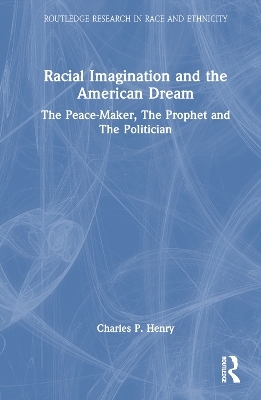
Racial Imagination and the American Dream
The Peace-Maker, The Prophet and The Politician
Seiten
2023
Routledge (Verlag)
978-1-032-40466-0 (ISBN)
Routledge (Verlag)
978-1-032-40466-0 (ISBN)
This book considers the American dream from the perspective of three of its most successful African American advocates - Ralph Bunche, Martin Luther King, Jr. and Barack Obama - examining their self-perception in relation to that dream and the effects of their achievements on societal perceptions of the American dream and Blacks themselves.
Although the phrase "the American Dream" dates from the 1930s, the concept or idea of the American Dream is as old as the country. The values proclaimed in the Declaration of Independence and reaffirmed (and extended) in the Gettysburg Address have been continuously promoted by every American president. Moreover, they form the basis of our national collective narrative as expressed through both elite and popular culture. The American Dream is intrinsically tied to the American Creed and American Exceptionalism. It is the foundation of our national identity, the glue that holds together our individual aspirations. Yet until the mid-twentieth century, the American Dream excluded African Americans. We as a nation—as an imagined community—could not imagine an integrated, multiracial society with Blacks and Whites living together as equals.
By examining the lives of the only three African American Nobel Peace Prize winners, we can see how their lives were shaped by the American Dream, and how their success was used to deny the structural racism that prevented others from achieving the American Dream. Ralph Bunche as a role model of academic and technical expertise, Martin Luther King, Jr., as a model race leader, and Barack Obama as a political leader provide a window on the changing meaning of the American Dream.
In conclusion, Haiti is presented as a failed example of an attempt to export the American Dream in the form of American Exceptionalism, and racial reparations are reimagined as a radical democratic project aimed at true global integration and justice.
Although the phrase "the American Dream" dates from the 1930s, the concept or idea of the American Dream is as old as the country. The values proclaimed in the Declaration of Independence and reaffirmed (and extended) in the Gettysburg Address have been continuously promoted by every American president. Moreover, they form the basis of our national collective narrative as expressed through both elite and popular culture. The American Dream is intrinsically tied to the American Creed and American Exceptionalism. It is the foundation of our national identity, the glue that holds together our individual aspirations. Yet until the mid-twentieth century, the American Dream excluded African Americans. We as a nation—as an imagined community—could not imagine an integrated, multiracial society with Blacks and Whites living together as equals.
By examining the lives of the only three African American Nobel Peace Prize winners, we can see how their lives were shaped by the American Dream, and how their success was used to deny the structural racism that prevented others from achieving the American Dream. Ralph Bunche as a role model of academic and technical expertise, Martin Luther King, Jr., as a model race leader, and Barack Obama as a political leader provide a window on the changing meaning of the American Dream.
In conclusion, Haiti is presented as a failed example of an attempt to export the American Dream in the form of American Exceptionalism, and racial reparations are reimagined as a radical democratic project aimed at true global integration and justice.
Charles P. Henry is Professor Emeritus of African American Studies at the University of California at Berkeley, USA, and Chair of the Board of the Center for Victims of Torture. He is the author/editor of nine books including Black Studies and the Democratization of American Higher Education and Long Overdue: The Politics of Racial Reparations, the editor of Foreign Policy and the Black (Inter)national Interest, and the co-editor of The Obama Phenomenon: Toward a Multiracial Democracy.
1. Introduction 2. Ralph Bunche: A Worldview of Race 3. King’s Dream 4. Barack Obama: Reclaiming the American Dream 5. American Exceptionalism: The American Dream Exported 6. Reimagining Racial Reparations
| Erscheinungsdatum | 30.08.2023 |
|---|---|
| Reihe/Serie | Routledge Research in Race and Ethnicity |
| Verlagsort | London |
| Sprache | englisch |
| Maße | 156 x 234 mm |
| Gewicht | 453 g |
| Themenwelt | Geisteswissenschaften ► Geschichte |
| Sozialwissenschaften ► Ethnologie | |
| Sozialwissenschaften ► Politik / Verwaltung | |
| Sozialwissenschaften ► Soziologie ► Spezielle Soziologien | |
| ISBN-10 | 1-032-40466-3 / 1032404663 |
| ISBN-13 | 978-1-032-40466-0 / 9781032404660 |
| Zustand | Neuware |
| Haben Sie eine Frage zum Produkt? |
Mehr entdecken
aus dem Bereich
aus dem Bereich
eine Einführung
Buch | Softcover (2024)
De Gruyter Oldenbourg (Verlag)
29,95 €


